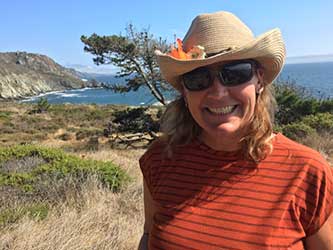Position: Project Manager, State Coastal Conservancy (SCC)
November 2020
Marilyn Latta has been working with the State Coastal Conservancy since 2008 in their San Francisco Bay Program. A fifth generation Bay Area native, Marilyn has always felt a special affinity for the Bay, even though there was a lot less access to the shoreline when she grew up in San Jose. Now working for a state agency with a mission to protect and increase access to the California coast and watersheds, Marilyn “loves participating in this kind of collaborative work to restore our incredible estuary.”
Marilyn graduated from Humboldt State University in 1995 with a degree in Marine Biology and Zoology. She credits Dr Gary Brusca, author of many widely used textbooks on invertebrate biology, as a stand out source of inspiration for her (and many other students), thanks to time spent in the tide pools near the HSU Marine Science Center in Trinidad.
After graduating, Marilyn went on to work for a variety of non-profit organizations with a mission to involve people in the protection of the ocean and estuaries. She left her highly engaged redwood coastal community to experience life in a variety of areas along the CA coast, including Catalina Island for two years and teaching marine science in an outdoor field school setting. She eventually ended back in the Bay Area to help start Save the Bay’s community-based restoration program where she directly engaged with thousands of kids and volunteers in hands on restoration. Marilyn has always loved linking Bay Area residents with science and the estuary because she believes “it is so important to connect this work with the public” adding “most people want to get involved in helping their bay, but have literal and/or figurative barriers to it.”
Whether it is planting natives or removing invasive plants, designing nature-based features to link transition zones from the upland ecotone to the nearshore bay, or using barges to place natural materials that will protect our shorelines in the face of sea level rise, Marilyn has probably done it or in some way been involved. She brings a wealth of experience to every project she takes on, from finding the money to restore creeks and provide bay trail access to managing large, complex regional efforts such as the Invasive Spartina and Living Shorelines Projects. Indeed, her familiarity with and appreciation of all phases of restoration work, may be one of her greatest assets, certainly cherished by her colleagues. “I’m really interested in all kinds of habitats and manage many different types of projects, but I often get identified as the Subtidal Habitat proponent,” which is just fine by her, she says.
Recently Marilyn has been spending time helping move forward the “Terminal Four Wharf Removal” project, one that has been in the collective mind’s eye for a while by many players: the City of Richmond, State Coastal Conservancy, Bay Conservation and Development Commission, National Oceanic and Atmospheric Administration, and others. In short, the project will move thousands of tons of debris out of the bay and thereby implement a key action from the SF Bay Subtidal Habitat Goals which many SFBJV members helped develop.
When asked about her proudest moments, Marilyn said “When the fundraising and design planning is done and the work is happening on the ground. Hard work, performed by many others!” she adds. “When the oyster reefs are being built, eelgrass is planted, invasive spartina is being eradicated, marshes and creeks are being restored and the large teams of people working together feel forward movement and accomplishment.” Marilyn also feels an increasing sense of urgency to strengthen our natural systems and adapt to climate change. “I hope we can build many new living shorelines per year instead of it taking years between projects.”
When not consumed with working to help keep the Bay in the Bay Area, Marilyn loves to get outside, especially anywhere on or near the water. This has been even more important to her during the pandemic! It is critical to her well being to be in nature enjoying socially distanced visits with friends and family. She is also a home gardener and fruit picker and preserver, who has started to realize she should “probably start taking a month off each year when the apricots get ripe.”

